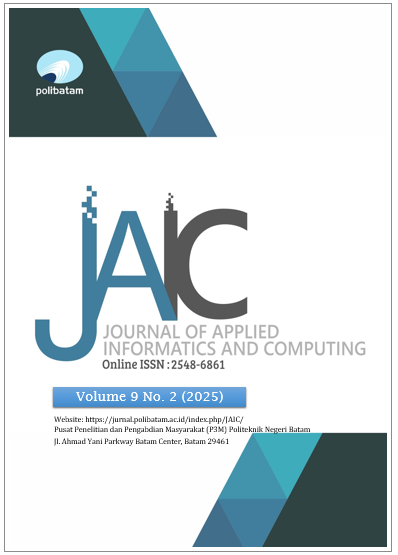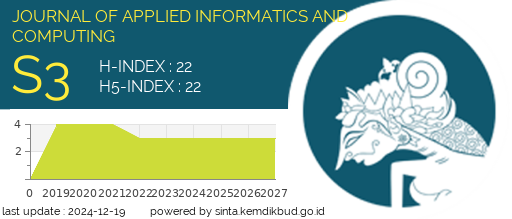Implementation of Apriori Algorithm in Identifying Purchase Relationships at Bluder Cokro Pakuwon Mall
DOI:
https://doi.org/10.30871/jaic.v9i2.9154Keywords:
Bluder Cokro, Apriori Algorithm, CRISP-DM, Association Rules, Data MiningAbstract
Bluder Cokro Store, located at Pakuwon Mall, specializes in traditional bluder bread with a wide range of flavor variations. This study aims to identify consumer purchasing patterns at the store to enhance promotional strategies and optimize product placement. The research applies the Cross Industry Standard Process for Data Mining (CRISP-DM) methodology, which includes phases such as business understanding, data understanding, data preparation, modeling, evaluation, and deployment. The dataset used consists of 4,371 transactions from October to December 2024. This study uses the Apriori algorithm to find patterns of association between products, with the goal of determining the scope of correlation between products and frequently co- purchased items. The results reveal nine significant association rules, with the strongest relationship observed between coklat keju and keju, having a support value of 0.100394 and a lift of 1.31. These findings indicate that strategic product placement and bundling promotions can enhance sales performance. Optimizing the store layout by placing coklat keju near coklat can increase purchase likelihood, while targeted discounts, such as "Buy coklat keju, get 10% off keju," can drive transaction values. This study serves as a recommendation framework rather than an experimental validation, offering insights on how transaction data and association rule mining can inform business decisions. The findings offer actionable insights for improving store layouts and promotional effectiveness, making this research valuable for retailers.
Downloads
References
[1] H. N. Utami, S. N. Wiyono and A. Nugraha, “Pengambilan Keputusan Pengadaan Produk Segar Dan Kinerja Layanan Suplier Di Ritel Supermarket: Sebuah Perspektif Business-To-Business,” Agricore: Jurnal Agribisnis Dan Sosial Ekonomi Pertanian UNPAD, vol. 9, no. 1, pp. 48-61, 2024.
[2] Y. A. Alhillah, W. Priatna and A. Fitriyani, “Implementation of Apriori Algorithm for Determining Spare Parts Product Recommendation Packages,” Journal of Applied Informatics and Computing (JAIC), vol. 7, no. 2, pp. 212-217, 2023.
[3] K. Martowinangun, D. J. S. Lestari and K. Karyadi, “Pengaruh Strategi Promosi Terhadap Peningkatan Penjualan Di Cv. Jaya Perkasa Motor Rancaekek Kabupaten Bandung,” Jurnal Co Management, vol. 1, no. 1, pp. 139-152, 2023.
[4] S. Tualeka, F. Alameka and N. W. W. Sari, “Implementasi Data Mining Untuk Memprediksi Penjualan Dan Penempatan Stok Barang Pada Cv Pasti Jaya Houseware Dengan Menggunakan Algoritma Apriori,” SEMINASTIKA, vol. 3, no. 1, pp. 115-123, 2021.
[5] M. H. Santoso, “Application of Association Rule Method Using Apriori Algorithm to Find Sales Patterns Case Study of Indomaret Tanjung Anom,” Brilliance: Research of Artificial Intelligence, vol. 1, no. 2, pp. 54-65, 2021.
[6] H. Xie, “Research and Case Analysis of Apriori Algorithm Based on Mining Frequent Item-Sets,” Open Journal of Social Sciences, vol. 9, no. 4, pp. 458-468, 2021.
[7] R. Takdirillah, “Penerapan Data Mining Menggunakan Algoritma Apriori Terhadap Data Transaksi Sebagai Pendukung Informasi Strategi Penjualan,” Edumatic: Jurnal Pendidikan Informatika, vol. 4, no. 1, pp. 37-46, 2020.
[8] N. Purwati, Y. Pedliyansah, H. Kurniawan, S. Karnila and R. Herwanto, “Komparasi Metode Apriori dan FP-Growth Data Mining Untuk Mengetahui Pola Penjualan,” Jurnal Informatika: Jurnal pengembangan IT (JPIT), vol. 8, no. 2, pp. 155-161, 2023.
[9] K. Dion, I. P. Satwika and W. N. Utami, “Analisis Transaksi Penjualan Barang Menggunakan Metode Apriori pada UD. Ayu Tirta Manis,” Jurnal Krisnadana, vol. 1, no. 2, pp. 11-20, 2022.
[10] R. Anugrah, T. Widiharih and S. Sugito, “GUI R Untuk Analisis Keranjang Belanja Dengan Algoritma Apriori Pada Suatu Perusahaan E-Commerce,” Jurnal Gaussian, vol. 11, no. 2, pp. 278-289, 2022.
[11] M. Fitriani, G. F. Nama and M. Mardiana, “Implementasi Association Rule Dengan Algoritma Apriori Pada Data Peminjaman Buku Upt Perpustakaan Universitas Lampung Menggunakan Metodologi CRISP-DM,” Jurnal Informatika dan Teknik Elektro Terapan (JITET), vol. 10, no. 1, pp. 41-49, 2022.
[12] A. D. Kuswanto, A. R. Blessar, A. Goni, A. N. N. Sidiki, O. R. A. Haryu and H. A. Hamiki, “Penerapan Algoritma Apriori Dalam Analisis Keranjang Belanja Retail Di Wilayah Jawa Barat,” Saturnus : Jurnal Teknologi dan Sistem Informasi, vol. 2, no. 3, pp. 139-150, 2024.
[13] E. Kaban, I. G. M. Darmawiguna and M. W. A. Kesiman, “Optimizing Customer Purchase Insights: Apriori Algorithm for Effective Product Bundle Recommendations,” Brilliance: Research of Artificial Intelligence, vol. 4, no. 2, pp. 747-756, 2024.
[14] A. Silvanie, “Pencarian Frequent Itemset Dengan Algoritma Apriori Dan Python. Studi Kasus: Data Transaksi Penjualan Eceran Online di UK,” JUNIF Jurnal Nasional Informatika, vol. 1, no. 2, pp. 103-113, 2020.
[15] M. Mandić, I. Gregurec and U. Vujović, “Measuring The Effectiveness Of Online Sales By Conducting A/B Testing,” Market-Tržište, vol. 35, no. 2, pp. 223-249, 2023.
[16] S. Styawati, A. Nurkholis and K. N. Anjumi, “Analisis Pola Transaksi Pelanggan Menggunakan Algoritme Apriori,” Jurnal Sains Komputer & Informatika (J-SAKTI), vol. 5, no. 2, pp. 619-626, 2021.
[17] F. J. M. Arboleda, G. Garani and A. F. A. Correa, “Supermarket Product Placement Strategies Based on Association Rules,” IAENG International Journal of Computer Science, vol. 51, no. 6, pp. 650-662, 2024.
[18] A. Irfan and . I. G. A. K. G. Suasana, “The Effect of Bundling Strategy, Price Perception, and Brand Image on Purchase Decisions (Study on Local Fast Food Retailers in Bali Indonesia),” American Journal of Humanities and Social Sciences Research (AJHSSR), vol. 5, no. 6, pp. 295-299, 2021.
[19] K. A. Carroll, A. Samek and L. Zepeda, “Consumer Preference for Food Bundles under Cognitive Load: A Grocery Shopping Experiment,” Foods 2022, vol. 11, no. 7, p. 973, 2022.
[20] Y. Fang, R. Wang, M. Guo and Y. Hou, “Product bundling for online supermarkets by frequent itemset mining and optimization approach mining and optimization approach,” Procedia Computer Science, vol. 207, pp. 4434-4441, 2022.
Downloads
Published
How to Cite
Issue
Section
License
Copyright (c) 2025 Angeline Ivana, Indra Maryati

This work is licensed under a Creative Commons Attribution-ShareAlike 4.0 International License.
Authors who publish with this journal agree to the following terms:
- Authors retain copyright and grant the journal right of first publication with the work simultaneously licensed under a Creative Commons Attribution License (Attribution-ShareAlike 4.0 International (CC BY-SA 4.0) ) that allows others to share the work with an acknowledgement of the work's authorship and initial publication in this journal.
- Authors are able to enter into separate, additional contractual arrangements for the non-exclusive distribution of the journal's published version of the work (e.g., post it to an institutional repository or publish it in a book), with an acknowledgement of its initial publication in this journal.
- Authors are permitted and encouraged to post their work online (e.g., in institutional repositories or on their website) prior to and during the submission process, as it can lead to productive exchanges, as well as earlier and greater citation of published work (See The Effect of Open Access).











